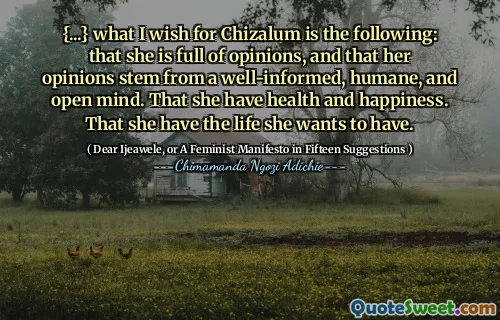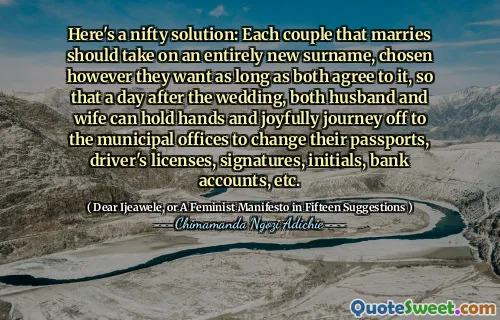
Here's a nifty solution: Each couple that marries should take on an entirely new surname, chosen however they want as long as both agree to it, so that a day after the wedding, both husband and wife can hold hands and joyfully journey off to the municipal offices to change their passports, driver's licenses, signatures, initials, bank accounts, etc.
This quote presents a compelling and refreshing perspective on the practice and symbolism of surnames within marriage, touching on themes of identity, equality, and partnership. Traditionally, many societies have expected one partner — almost invariably the wife — to adopt the husband's surname, a practice steeped in patriarchal tradition and historical power dynamics. By proposing that couples instead craft shared, entirely new surnames, it subverts these conventions and promotes true mutual consent and equality. It underscores that marriage and identity need not be anchored by historical precedents but rather by new beginnings that recognize the couple equally.
The act of choosing a new surname together highlights the transformative nature of marriage as a union of two individuals merging aspects of their lives, not one person subsuming another. The imagery of both partners joyfully going to change official documents with their new shared name captures a powerful moment of partnership and collective action. It also hints at how bureaucratic processes could better accommodate modern conceptions of identity and equality.
Additionally, this idea resonates with broader feminist perspectives on dismantling patriarchal norms, advocating for practices that honor individual autonomy and shared power. It challenges the legal and cultural legacies governing names and identity, inviting reflection on how such customs shape perceptions of gender roles and personal agency.
In essence, this quote invites us to rethink deeply ingrained traditions, fostering conversations about equality, love, and identity that align well with the progressive values championed in Chimamanda Ngozi Adichie's work, particularly within contexts of feminism and social change.







